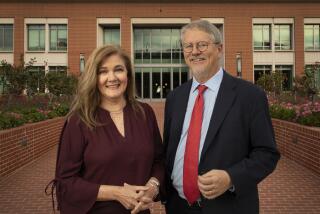Sickle Cell Agency Is a Beacon of Hope : Aid: Crenshaw-based organization provides information, services and emotional support.
For 38 years, the Sickle Cell Disease Research Foundation has been the backbone for sufferers of the disease and parents of sickle cell children in Los Angeles, providing information, encouragement and assistance in crisis situations.
But as obscure as the disease is for so many people, so is the small, Crenshaw-based organization.
“Each day we receive calls from adults with sickle cell disease who’ve lived in the L.A. area most of their lives and have never heard of us,” said Mary Brown, executive director of the foundation.
Despite efforts to get the word out about sickle cell disease, the foundation’s staff of eight still finds itself working in somewhat of a black hole. Few people know about it and even fewer understand it.
*
The lack of education is due in large part to the minimal exposure of sickle cell disease, said Brown, who has been with the foundation for 20 years. Sickle cell disease has been eclipsed by cancer and AIDS, or in some cases written off as a black disease, or thought to have been cured years ago, like polio, she said.
“We find that parents of kids with sickle cell don’t have enough information about the disease and can’t treat their children properly,” Brown said.
A recent parent-support meeting devoted nearly all of its two hours to explaining the genetics of sickle cell trait and sickle cell disease.
The limited awareness about sickle cell disease and the foundation has also led to a drop in funding. For several years, the foundation has been struggling to get recognition for its programs amid recessions and continuous government and corporate cutbacks.
“I guess our battle is uphill, and we’re swimming against one of the strongest currents you could ever imagine,” Brown said.
A $200,000 contract with the state pays for the free blood tests for sickle cell trait and disease that the foundation provides. The remaining funding for the organization’s $650,000 budget comes from grants and individual donations. Both are scarce, however. Brown has a pile of rejection letters to the foundation’s grant proposals, and the office sees little in the way of major funding from individuals.
Its biggest boost of late has come from comedian Sinbad, who won $10,000 on “Celebrity Jeopardy” for the foundation. KNBC weatherman Christopher Nance, who has sickle cell disease, is also very active with the foundation and is planning a fund-raising golf tournament.
“The foundation does good work,” Nance said. “It’s helped a lot of people and it needs to be able to help a lot more.”
When it began in 1957, the Sickle Cell Disease Research Foundation was staffed by a few research doctors and a smattering of volunteers. It was the first of its kind in the country to offer assistance to those suffering from the debilitating and deadly blood disorder and to fund research projects.
Today, it has grown into a major resource for many sickle cell sufferers in Los Angeles and serves as a blueprint for sickle cell organizations across the country.
*
The foundation, which is tucked away in a second-floor office in the Great Western Bank building on Crenshaw Boulevard, helps more than 150 families and 5,000 individuals in Los Angeles and Southern California, about 85% of whom are low-income.
The organization subsidizes foods for these families and also provides them with clothes, medication, free blood tests for sickle cell, ambulatory assistance, holiday baskets and other free services.
“The foundation has really helped a lot,” said Ellen, 47, whose 17-year-old daughter, Natasha, has sickle cell disease. Ellen asked that her real name and her daughter’s name not be used.
“Dealing with the Sickle Cell Disease Research Foundation has helped me understand a lot about (the disease), but more important, it’s been good for my daughter to know she’s not the only kid with this,” Ellen said.
Since 1967, the organization has run a weeklong summer camp program for youngsters with sickle cell disease. More than 200 children each year, some from as far away as South Carolina, participate in the camp program. For some children, the camp is their first chance to romp around and do activities like their peers without feeling strange because they don’t have the same stamina.
More to Read
Sign up for Essential California
The most important California stories and recommendations in your inbox every morning.
You may occasionally receive promotional content from the Los Angeles Times.










